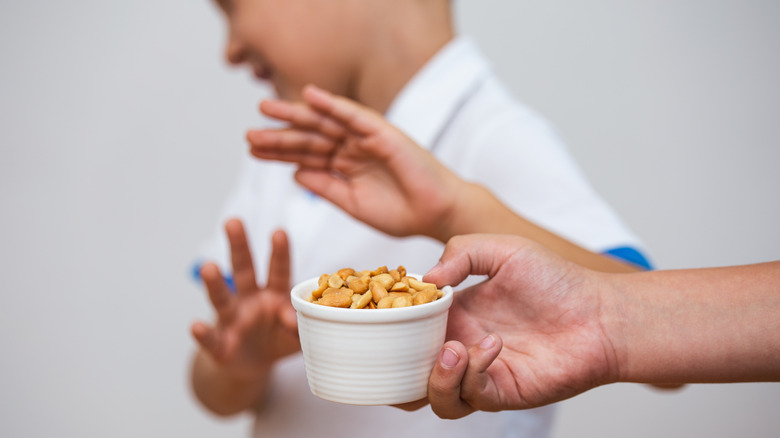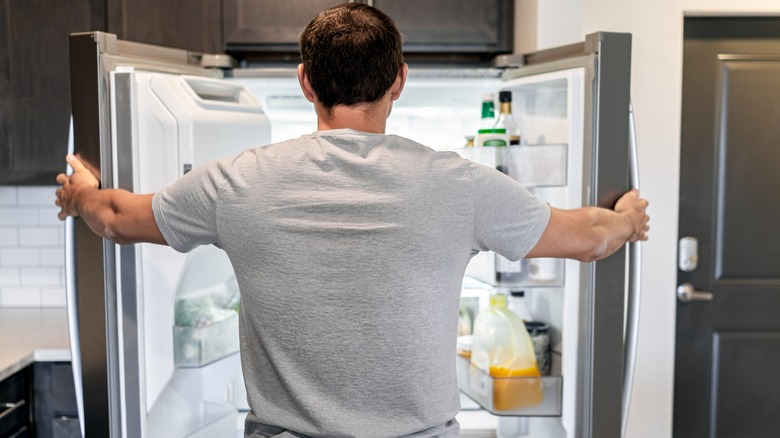Why You Should Avoid Eating Nuts After Weight Loss Surgery
For people struggling with their weight, bariatric surgery can be a possible solution, especially if dieting and exercise aren't producing results (via Mayo Clinic). It can also be beneficial for people whose weight problems are affecting their health, putting them at risk for heart disease, stroke, and diabetes.
The procedure makes changes to the digestive system in order to curtail the amount of food ingested and alter the way the body processes food to help mitigate hunger, as per the American Society for Metabolic and Bariatric Surgery. There are a number of weight-loss procedures a person can try, each one having different pros and cons. For example, a sleeve gastrectomy, known as the sleeve, removes approximately 80% of your stomach. On the other hand, a gastric bypass procedure divides the stomach, sealing off the larger portion of the stomach and allowing the food to travel into a smaller, pouch-sized portion of the stomach. You should discuss with your doctor and bariatric surgeon which type of surgery is best for you.
After weight loss surgery, it's important to follow a proper diet and avoid certain foods immediately following the procedure, explains Bariatric Centers of America. These include starchy vegetables, spicy foods, and empty calories. In addition, although they're often considered a healthy snack, post-bariatric patients should avoid nuts.
The reasons you shouldn't consume nuts
For all of their antioxidant properties, nuts are rich in calories. A quarter cup of almonds alone packs close to 200 calories, according to Bariatric Centers of America. Since the average person eats more than a quarter cup of nuts at any given time, those calories add up fast. In addition, nuts are digested more quickly than other foods, which means you're going to get hungry again quickly.
In general, if you are undertaking bariatric surgery, you will have to make a wide range of dietary changes, both before surgery and after (via Healthline). Prior to your surgery, your doctor will most likely put you on a diet that consists of lean protein, vegetables, and low- or no-calorie drinks. Immediately following surgery, you'll be on a liquid diet to prevent complications such as bowel obstruction, constipation, and diarrhea, among other problems. You will not, and most definitely should not, eat solid foods until you are one month out from your surgery.
Not following a proper diet can have consequences
It's important to maintain a healthy and proper diet after bariatric surgery in order to avoid what's known as dumping syndrome, according to the University of Rochester Medical Center. Dumping syndrome occurs when your food travels directly from the stomach pouch into the small intestine. When a concentrated mass of food is deposited into the small intestine, it can cause symptoms such as bloating, cramping, and diarrhea. It can also impact your heart rate and blood pressure because of hormones that are released into the bloodstream.
All in all, following weight-loss surgery, you will want to revamp your diet to not only accommodate the changes to your body but to adopt a healthier lifestyle that is more conducive to maintaining a healthy weight. In other words, you should eat three meals a day at regular intervals, chew your food at least 20 times before swallowing, and take your time when you eat (via Temple Health). An average meal should last around 20 minutes. In addition, work with your doctor and your dietitian to make sure that you are staying healthy and help you work through any issues that may arise as you recover from surgery and move towards a new, healthier way of living.



